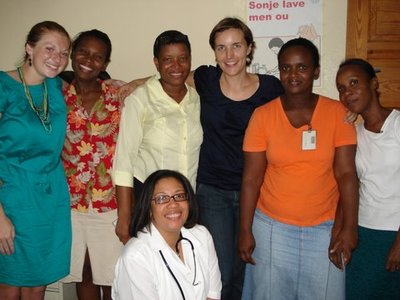Cora Walsh - Les Centres GHESKIO
by Cora Walsh
 Cora and the pediatric nutrition team
Cora and the pediatric nutrition team
Following my first year of medical school, I had the opportunity to spend the summer in Port au Prince, Haiti at the GHESKIO center for clinical care and research in HIV/AIDS and related diseases. Through clinical rotations I was able to learn from Haitian physicians about comprehensive care for HIV/AIDS patients and the particular needs and difficulties faced in providing that care. Initially, I was staggered by seeing the sheer number of patients and degree of health-care needs faced at GHESKIO. As the summer went on, I learned how GHESKIO physicians manage the provision of care for these patients, as well as how the practice of clinical medicine can be intertwined with academic medical research to continuously improve the health care available for patients at the center.
In addition to shadowing physicians, I was able to participate in ongoing research at GHESKIO. I spent the majority of my time in the pediatric nutrition department, working with a study designed by Rebecca Heidkamp (Cornell University PhD student in Nutritional Sciences) on an infant feeding support program that aims to improve growth outcomes for children of HIV-infected mothers. These children, in the urban, poor and HIV-affected population, are particularly nutritionally at risk due to a high level of food insecurity, high rate of diarrheal infections, and the predominant lack of breastfeeding by HIV-infected mothers. These risks are highest in the period from 6-12 months of age when children at GHESKIO fall between the provision of infant formula for the first 6 months of life and the age of 12 months, when a full transition to family foods can be made. The infant feeding support program follows children in cohorts through caregiver clubs that meet monthly, incorporating distribution of the nutritional supplements, charting the children’s growth, individual nutritional counseling for the caregivers, and critically, providing preventive health education and social support. After months of time in the classroom at Cornell, it was a great opportunity to work with a community health program being practiced in a clinical setting with a focus on preventive primary care. More so, I learned some of the challenges that exist in preventing childhood infections and treating nutritional risk factors when the environmental and social circumstances are so far beyond one’s control. In addition, we also worked on a project conducting chart review for a study on the costs of hospitalization associated with treating HIV/AIDS patients, in relation to the timing of commencing anti-retroviral therapy. Through reading each patient case, even the limited clinical knowledge from our first year of medical school enabled us to understand the severity and difficulties of addressing the disease burden in a resource-constrained context such as Haiti. As medical students we are taught the importance of patient-centered care, an approach to medicine that often seems easily sidelined in lieu of a focus on diagnosis. However, at GHESKIO the importance of patient-centered approaches could not be understood more directly. Whether watching the nutrition team address the food insecurity faced by a young mother or a physician help an HIV-infected adolescent devise a strategy for adhering to their anti-retroviral therapy regime, I learned firsthand how the provision of care is intertwined with the needs and realities that patients face- and the challenges and successes in that process. While I know this was just a beginning exposure for me to working in this type of context, I’m grateful for the lasting memories of the rich experiences we had and all the people we learned from over the summer in Haiti.
Weill Cornell Medicine Center for Global Health
Center for Global Health
420 East 70th Street, 4th Floor, Suite LH-455
New York, NY 10021
Phone: (646) 962-8140
Fax: (646) 962-0285

